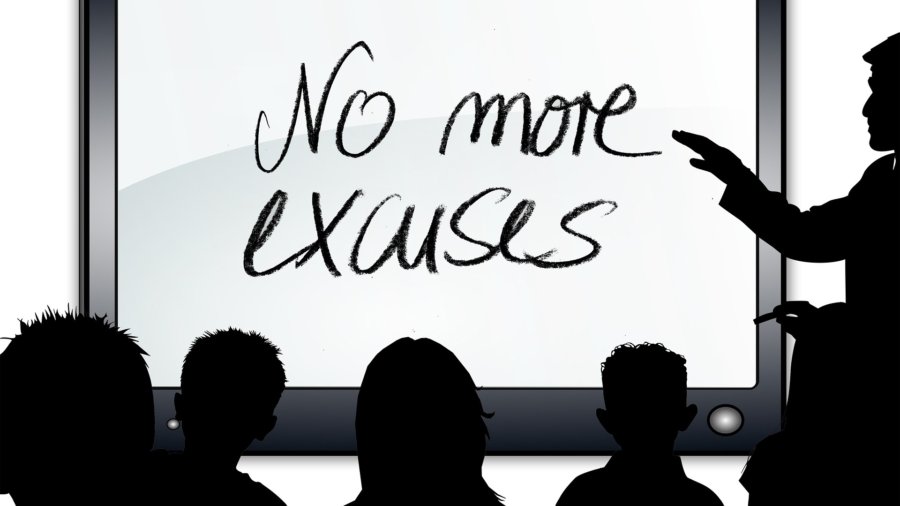Excusitis बहानासाइटिस is used to describe the Psychology of a person that finds all sorts of Excuses to justify poor performance and lack of action.
People with Excusitis बहानासाइटिस often have psychology of play the blame game, making excuses to external factors rather than taking accountability for their own poor performance. In today’s environment, success is related to people. To know what success means, you need to understand people well. Watching and learning from successful people can help you achieve your own success. The main difference between successful and unsuccessful people is their attitude towards excuses. Successful people keep going and don’t stop until they reach their goals. Unsuccessful people keep making excuses for why they can’t do things. Successful people don’t make excuses.
Excusitis बहानासाइटिस Worsens with Time – The habit of making excuses, like any disease, gets worse if you don’t treat it early. Every time someone makes an excuse, it gets stuck in their mind. Then, the more they use the same excuse, the more they believe the negative thoughts it creates, and the more likely they are to fail.”
The First Step to Success
To have a mindset that focuses on success and to stop making excuses all the time, the first thing you need to do is to start paying attention to when you make excuses and stop doing it.

Exposing the Excuses of Excusitis बहानासाइटिस: Unveiling the Four Main Psychology of Excuses Obstacles to Success
A. What should I do, I am not feeling well?
Many people find reasons why they can’t solve their health problems, but the truth is, everyone has health problems. What sets apart those who improve their health from those who don’t is their mindset. Some people let their health problems control their lives, while others see them as hurdles to jump over and become stronger from.
A soldier who lost his arm in battle said it best: “I still have one arm. It’s true that two arms are always better than one, but if I had to lose an arm to save my life, it’s worth the sacrifice. I’m still alive and well, and I’m thankful for that
If you’re making excuses about your health, it’s time to stop and instead of a psychology of making Excusitis बहानासाइटिस, focus on your strengths and performance what you can do, despite your challenges. Remember, you are still 100% alive, and you have the power to live a full and meaningful life.
Practical Tips to Combat Health-Related “Excusitis बहानासाइटिस”:
- Avoid excessive talk about illnesses, even minor ones.
- Stop fretting about your health.
- Instead of focusing on your flaws, appreciate your good health.
- Live life to the fullest and don’t get bogged down by thinking about the meaning of life
Key Takeaways:
- It’s normal to have health problems, but they don’t have to control your life.
- Pay attention to the things you do well, practice being thankful, and do something about the health problems you’re using as excuses
B. I don’t have as much intelligence as successful people?
A common psychology of excuses or say Excusitis बहानासाइटिस people often use to justify their lack of success and performance is the belief that they don’t possess the same level of intelligence as those who achieve great things. This self-limiting mindset can hinder personal growth and prevent individuals from reaching their full potential.
It’s important to remember that intelligence isn’t something you’re born with, but rather a skill that can be improved over time, just like you can strengthen your muscles by exercising. With focused practice and learning, you can boost your brainpower.
Here are some important tips for overcoming psychology of intelligence-related excuses or say Excusitis बहानासाइटिस and embracing your potential:
- Challenge Your Beliefs: Don’t think that you can’t learn more and get smarter. Instead, believe in yourself and keep learning new things. The more you learn, the more you’ll know.
- Embrace Continuous Learning: Never stop seeking knowledge and expanding your understanding of the world. Read books, take courses, engage in stimulating conversations, and explore new areas of interest.
- Practice Critical Thinking: Learn to break down information fairly, consider different points of view, and make your own conclusions that are well-supported.
- Mistakes are valuable lessons: Don’t let mistakes and setbacks make you think you’re not smart. Instead, view them as opportunities to learn and improve. Use the lessons you’ve learned from your experiences to change your approach to things.
- Surround Yourself with Stimulating People: Seek out individuals who challenge your thinking, encourage you to think critically, and inspire you to reach your full potential.
Don’t think you need to be super smart to succeed. Intelligence is like a tool that you can make better by practicing and working hard. If you believe in yourself and keep learning, you can get smarter and do amazing things
C. I have age barriers to?
“I’m too old for this.” “I’m not young enough to start that.” These are just a few of the age-related Excusitis बहानासाइटिस psychology that people often use to justify and give excuses to their inaction or lack of ambition. Your age doesn’t matter. It should never stop you from trying new things and reaching your goals. If you keep making excuses about being too old, you’ll never be happy. Instead of thinking about what you can’t do, think about what you can do. Focus on your strengths and what you’re good at. That way, you can achieve anything you set your mind to.
Many people have achieved great things at all ages. Some examples include Colonel Harland Sanders, who started Kentucky Fried Chicken at the age of 62, Grandma Moses, who didn’t start painting until she was in her 70s, and Vera Wang, who didn’t start designing wedding dresses until she was in her 40s.
The Creative Age of a Normal Person Can Last Up to 70 Years. Some studies have shown that people can be creative for up to 70 years. This means that even if you are older, you can still be creative and productive. For example, if you are 40 years old now, you still have 30 years of creative life ahead of you.

Here are a few tips for overcoming the psychology of age-related excuses or say Excusitis बहानासाइटिस:
- Focus on what you do well. What are the things you’re naturally good at? What activities do you find fun and enjoyable?
- Set goals that you can reach. Don’t try to do too much too soon. It’s better to start with small goals and work your way up to bigger ones.
- Make your goals into smaller steps. This will make them seem less scary and more achievable.
- Find people who can help you. Talk to your friends, family, or a therapist about your goals. They can give you encouragement and support.
- Don’t give up, even if things get hard. There will be times when you want to quit, but don’t let those setbacks discourage you. Just keep working hard, and you will eventually reach your goals
D. I have so much bad luck?
One of the most common Excusitis बहानासाइटिस psychology we employ to justify these disappointments and poor performance is the excuses of ‘bad luck’. When we blame our problems on things outside of our control, we’re letting ourselves off the hook and preventing ourselves from growing and changing. This way of thinking, called a victim mentality, keeps us stuck in a cycle of negativity and inaction. Instead of taking charge of our lives and finding solutions, we let “bad luck” control us. To break free from this self-defeating narrative or psychology, we must first acknowledge the fallacy of bad luck as an excuses, or what we call Excusitis बहानासाइटिस. Rather than succumbing to the idea that we are mere puppets of fate, we must recognize our inner strength and ability to shape our own realities.

Tips dealing with the psychology of Bad Luck-Related Excuses or say Excusitis बहानासाइटिस:
- Instead of seeing setbacks and excuses as signs of bad luck, think of them as chances to learn and grow. Every challenge we face can teach us something valuable, making us stronger and better able to deal with change.
- Don’t just sit back and let things happen to you. Take charge of your life. Be responsible for your choices and actions. You have the power to control your own destiny.
- Don’t wait for bad things to happen before you take action. Be proactive and take steps to avoid problems. Think about what challenges you might face, make plans for dealing with them, and get help if you need it.


Your point of view caught my eye and was very interesting. Thanks. I have a question for you.
Thanks for sharing. I read many of your blog posts, cool, your blog is very good.
Thank you for your sharing. I am worried that I lack creative ideas. It is your article that makes me full of hope. Thank you. But, I have a question, can you help me?
Thanks for sharing. I read many of your blog posts, cool, your blog is very good.
Thanks for sharing. I read many of your blog posts, cool, your blog is very good.
Your point of view caught my eye and was very interesting. Thanks. I have a question for you.
Thanks for sharing. I read many of your blog posts, cool, your blog is very good.
Real Estate Good post! We will be linking to this particularly great post on our site. Keep up the great writing
BaddieHub I am truly thankful to the owner of this web site who has shared this fantastic piece of writing at at this place.
Thanks for sharing. I read many of your blog posts, cool, your blog is very good. https://accounts.binance.com/pt-BR/register-person?ref=YY80CKRN
Your point of view caught my eye and was very interesting. Thanks. I have a question for you.
allegheny county real estate Good post! We will be linking to this particularly great post on our site. Keep up the great writing
you are truly a just right webmaster The site loading speed is incredible It kind of feels that youre doing any distinctive trick In addition The contents are masterwork you have done a great activity in this matter
I loved as much as you will receive carried out right here The sketch is tasteful your authored subject matter stylish nonetheless you command get got an edginess over that you wish be delivering the following unwell unquestionably come further formerly again as exactly the same nearly very often inside case you shield this hike
Your article helped me a lot, is there any more related content? Thanks!
Your point of view caught my eye and was very interesting. Thanks. I have a question for you.
Can you be more specific about the content of your article? After reading it, I still have some doubts. Hope you can help me.